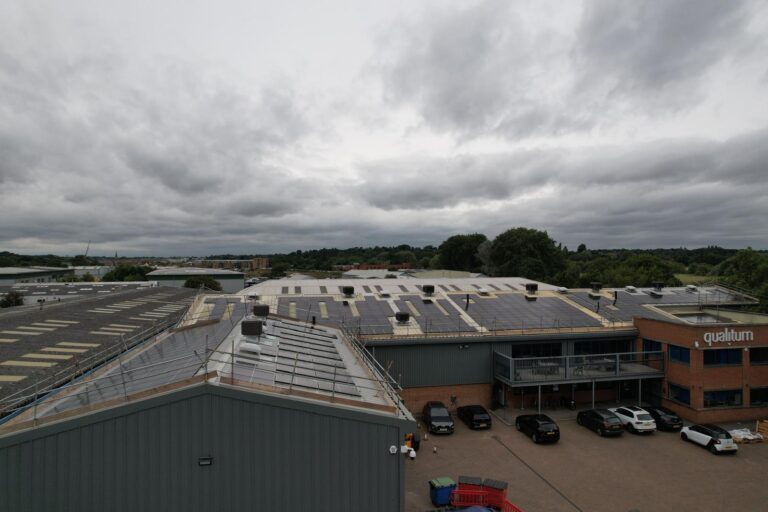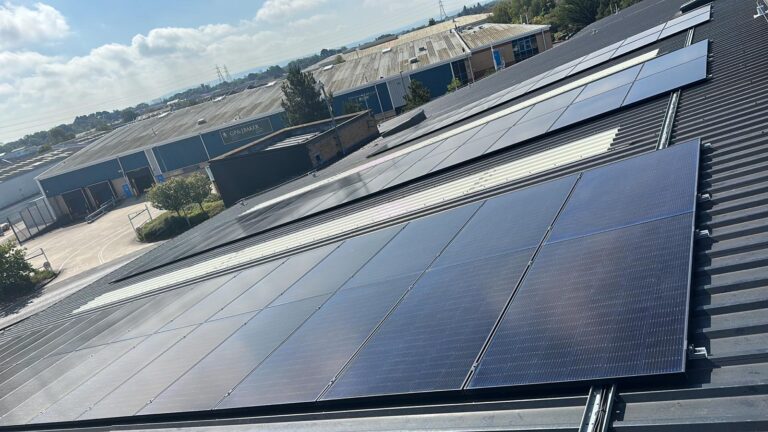Commercial Rooftop Solar Panels: The Untapped Goldmine for UK Warehouses and Offices
Commercial rooftop solar panels offer a valuable opportunity for UK businesses today. Energy prices are rising, and the push for sustainability is gaining momentum. Many warehouses and office buildings have prime roof space that is underused, even though it is perfect for clean, decentralised energy production.
At Excel Energy UK, we view rooftops as high-performing assets that can provide returns. Now is the time to capitalise on these underused assets.
Why Rooftop Solar Is Gaining Momentum in the UK
Though the UK has ambitious energy goals, less than 10% of available commercial rooftop space is currently used for solar energy. This represents a huge gap, considering the vast amount of idle roof space in our industrial estates, logistics parks, and commercial offices.
The government is pushing for clean, decentralised energy with support for wind, ground-mount solar, and battery storage. However, before using valuable land, why not fully utilise the existing infrastructure?
At Excel Energy, our rooftop-first philosophy promotes cost-effectiveness and quicker deployment. It also makes use of “dead” space that is currently unused. Unlike ground-based solar systems, rooftop solar does not require complex planning permissions, land clearing, or major construction work. It’s a smarter choice.
Market Outlook: The UK commercial rooftop solar market is expected to grow significantly in the next five years. Falling panel prices, better installation technology, and increased investor confidence drive this growth. Businesses are realising that installing commercial rooftop solar panels in the UK is not just environmentally friendly; it’s financially wise.

Massive Untapped Roof Space Equals Missed Opportunity
In the UK, warehouses, factories, business parks, and office complexes have vast amounts of unused roof space. These flat, accessible rooftops are ideal for solar PV systems.
To illustrate: A typical large warehouse with 50,000 square feet of roof can support over a 500 kW system, significantly offsetting the facility’s energy use.
The opportunity goes beyond rooftops. Car parks also offer untapped energy sources. Installing solar carports not only increases energy production but also provides shelter from rain, snow, and heat, improving comfort for employees and visitors. With decreasing costs for panels and structures, this option is now commercially viable.
We have seen firsthand how commercial rooftops can transition from inactive to vibrant, reducing on-site energy consumption by up to 70% while adding measurable value to the property.
Financial Advantages for Warehouses and Offices
Long-Term Electricity Savings
Electricity prices are increasing, especially for large commercial users. Rooftop solar systems can drastically reduce these costs. Many clients can benefit from up to 80% less dependence on grid power, stabilising their expenses for years.
Asset Appreciation
Installing rooftop solar PV systems increases the building’s value. They serve as long-term assets that boost marketability, yield, and ESG profile. This is especially appealing for real estate investment trusts (REITs) and long-leaseholders seeking to future-proof their portfolios.
Attractive Finance Models
Short on capital? No worries. There are many options to fund rooftop solar installations:
✅ Power Purchase Agreements (PPA)
✅ Hire Purchase Agreements (HPA)
These allow companies to install systems with no initial investment. In many cases, monthly payments are offset by savings on electricity bills. For energy-intensive operations, the system often pays for itself within 3 to 7 years, after which the business fully owns the asset.

Benefits Beyond Cost Savings - Lower Carbon Footprint
Rooftop solar helps organisations achieve their carbon reduction goals, becoming increasingly important as regulations tighten. Companies can also earn money by selling carbon credits to industries such as aviation.
ESG and CSR Credentials
Corporate clients, investors, and consumers are more focused on ESG criteria. Businesses that adopt commercial solar panels in the UK can strengthen their brand, attract new clients, and secure investment.
Silent, Low-Maintenance Operation
Solar PV systems have no moving parts, making them very reliable and quiet. Modern systems include remote monitoring platforms, making operation and maintenance easy.
Easy Installation and adaptability with Lightweight, High-Efficiency Panels
Recent improvements in solar technology, like Building-Integrated Photovoltaics (BIPV) and flexible panel designs, mean even buildings with limited structural capacity can utilise solar.
Zero Business Intrusion
At Excel Energy, we prioritise a zero-disturbance approach. From assessments to installation, we manage everything to ensure operations continue smoothly without hindering productivity.
Designed for Growth
Energy needs are not static, and our systems reflect that. We prepare every rooftop solar solution with expandable PV distribution boards and pre-installed containment, making future expansions simple.
Sector Highlight: Pharmaceutical Manufacturing Case Study
Project: 1.58 MW rooftop solar PV system for QuidelOrtho, a leader in pharmaceutical manufacturing.
Annual Results:
✅ £20,572,264 net profit over 25 years
✅ 272.16 tonnes of CO₂ savings yearly
✅ Over 1,200,000 kWh offset annually
✅ Significant decrease in operating costs
This case demonstrates how solar installations for warehouses in the UK can drive profits while supporting ESG goals.
Incentives Available for Rooftop Solar
The UK government offers various financial incentives and tax reliefs for companies investing in solar energy, such as:
Contracts for Difference (CfD) for large-scale systems
The CfD scheme is the government’s main tool for encouraging low-carbon electricity investment. It plays a key role in speeding up the energy transition.
CfDs provide developers the confidence to invest in renewable projects by stabilising revenue with a guaranteed ‘strike price’ for generated electricity. This protects developers from unpredictable market fluctuations and consumers from rising energy costs, benefiting the entire energy ecosystem.
Renewable energy generators in Great Britain can compete for CfDs by submitting sealed bids during competitive rounds. So far, there have been six auctions with various renewable technologies, including solar and wind.
Successful projects enter a 15-year private contract with the Low Carbon Contracts Company (LCCC), a government entity. The contract ensures that generators receive payments based on the difference between a pre-agreed strike price and the market price of electricity.
Who’s Involved?
Low Carbon Contracts Company (LCCC): A private firm managed by the Department for Energy Security and Net Zero (DESNZ). LCCC oversees contracts and payments throughout the lifecycle of CfD projects.


If you’re a commercial landlord, developer, or energy investor wanting to grasp how schemes like CfD work and where solar fits in, partnering with a knowledgeable installer like Excel Energy can ensure that you’re on track with both policy and progress.
Business Rates Exemptions for Eligible Rooftop Solar Installations
Installing solar panels on commercial properties in the UK brings significant financial benefits, including tax relief and lower overhead costs.
Here’s a quick overview:
Business Rates Exemption
Renewable Plant & Machinery Relief:
Since April 1, 2022, new renewable energy installations, including solar panels, do not count towards business rates valuations.
Self-Consumption Focus:
The exemption applies when the electricity is mainly used on-site by the business, not sold commercially.
Government Purpose:
The aim is to encourage green investments and reduce carbon footprints.
Tax Incentives
50% First Year Allowance (FYA):
Businesses can deduct 50% of new solar installation costs from taxable profits in the first year.
Depreciation of Remaining Cost:
The remaining 50% is written down at 6% each year.
Annual Investment Allowance (AIA):
Up to £1 million in qualifying investments can be fully deducted from profits in the purchase year.
Qualifying Conditions
To qualify for these tax incentives, systems must be:
Fixed to the building
Used for generating electricity for the business
Not portable or temporary
Additional Benefits
Smart Export Guarantee (SEG): A government-supported program that ensures businesses receive payment for any excess electricity they send to the National Grid.
How It Works:
Companies with solar PV systems up to 5 MW can register with an eligible SEG energy supplier.
Suppliers pay for every unit of electricity exported back to the grid.
Tariffs vary, so it’s beneficial to compare options. Unlike the previous Feed-in Tariff (FiT), SEG rates are not fixed and can often provide better deals based on market conditions.



(Rates are indicative and may change.)
Key Benefit: SEG guarantees that even surplus solar power generates income, providing a return whether or not all energy is consumed on-site.
Local Council Relief: Some councils offer additional business rate relief for projects benefiting the local community.
Various funding models, grants, and green business loans are available for commercial operators wanting to reduce capital expenses and speed up deployments.
Final Thought: Now Is the Time to Act
The data is clear. Commercial rooftop solar panels in the UK are not just a sustainability tool; they represent a competitive benefit, a source of income, and a valuable investment. Warehouses, office parks, factories, and logistics hubs hold significant solar possibilities that remain untapped.
At Excel Energy, we don’t just install panels; we help you realise the full energy, financial, and strategic value of your commercial space. Let’s turn your rooftop into a revenue source because, by 2025, wasted space means missed opportunities.
